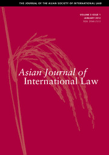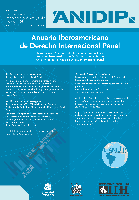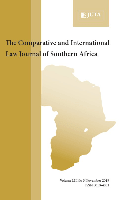
Asian Journal of International Law
Scope & Guideline
Pioneering Perspectives on Asia's Legal Challenges
Introduction
Aims and Scopes
- Interdisciplinary Approaches to International Law:
The journal emphasizes the integration of different disciplines, such as sociology, economics, and political science, into the study of international law, facilitating a broader understanding of legal issues in a global context. - Focus on Asian Jurisdictions and Perspectives:
It particularly highlights legal developments and issues pertinent to Asian countries, contributing to the global discourse by showcasing unique regional challenges and solutions within international law. - Emerging Themes in Global Governance:
The journal explores contemporary issues like climate change, human rights, and trade law, reflecting on how these themes are framed and addressed within international legal frameworks. - Historical Contextualization:
It seeks to understand the evolution of international law through historical lenses, examining colonial legacies, postcolonial developments, and their impacts on current legal practices. - Human Rights and Social Justice:
A consistent focus on human rights law and social justice issues, particularly in relation to marginalized groups, gender, and indigenous peoples, is evident in the journal's publications. - Investment and Trade Law:
The journal addresses international investment and trade law, analyzing treaties, arbitration cases, and their implications for economic relations in the Asian context.
Trending and Emerging
- Climate Change and Environmental Law:
An increasing number of articles are focusing on international law's role in addressing climate change, highlighting the importance of legal frameworks in environmental governance and sustainability. - Artificial Intelligence and Technology Regulation:
There is a growing trend towards exploring the implications of artificial intelligence and emerging technologies on international law, particularly concerning regulation, intellectual property, and ethical considerations. - Human Rights in the Context of Global Pandemics:
The COVID-19 pandemic has catalyzed discussions around public health law, human rights, and access to medical resources, reflecting a heightened awareness of the intersection between health and international law. - Decolonization and Global South Perspectives:
Emerging themes on decolonization and the legal perspectives of Global South countries are gaining traction, emphasizing the need to re-evaluate international law from these viewpoints. - Transnational Legal Issues and Global Governance:
The journal is increasingly focusing on transnational legal challenges, particularly those arising from globalization, trade, and investment, which require collaborative governance approaches. - Gender and International Law:
There is a notable rise in scholarship addressing gender issues within international law, including the legal frameworks surrounding gender equality, violence against women, and rights of marginalized communities.
Declining or Waning
- Traditional State-Centric Perspectives:
There has been a noticeable decrease in articles focusing exclusively on state-centric views of international law, as the discourse increasingly recognizes the roles of non-state actors and global governance. - Colonial Law and Historical Analysis:
While historical perspectives remain important, there appears to be a waning interest in traditional colonial law discussions, potentially overshadowed by more contemporary issues such as globalization and transnational legal challenges. - Regional Conflicts and Legal Responses:
Themes centered around specific regional conflicts have decreased, possibly due to the shifting focus towards broader global governance and collaborative legal frameworks. - Exclusively Legalistic Approaches:
There is a declining trend in papers that adopt a purely legalistic or doctrinal approach, as the journal increasingly favors interdisciplinary analyses that incorporate social, political, and economic dimensions.
Similar Journals

CORNELL INTERNATIONAL LAW JOURNAL
Navigating the complexities of law in an interconnected world.CORNELL INTERNATIONAL LAW JOURNAL, published by CORNELL LAW SCHOOL, is a premier academic journal dedicated to advancing scholarship in the fields of law, political science, and international relations. Established with a commitment to fostering critical dialogue, this journal provides a platform for innovative research and legal analysis on pressing global issues. With an ISSN of 0010-8812 and an E-ISSN of 1930-7977, CORNELL INTERNATIONAL LAW JOURNAL holds a respectable Q3 ranking in the 2023 categories of Law, and Political Science and International Relations, underscoring its relevance within the academic community. The journal is indexed in Scopus, achieving a rank of #416 in Law and #345 in Political Science, illustrating its significant impact and accessibility. By providing essential insights, this journal aims to serve not only academics but also practitioners and policymakers interested in the evolving landscape of international law and governance.

Asia Pacific Law Review
Advancing Legal Scholarship in a Dynamic RegionWelcome to the Asia Pacific Law Review, a prestigious academic journal published by Taylor & Francis Ltd that serves as a vital resource for scholars, practitioners, and students in the field of law. With its ISSN 1019-2557 and E-ISSN 1875-8444, this journal critically examines legal issues pertinent to the Asia Pacific region and promotes scholarly discourse. Recognized in the Q3 category for law by the 2023 category quartiles, the Asia Pacific Law Review stands out with a Scopus ranking of #574 out of 1025, placing it in the 44th percentile within the Social Sciences _ Law category. Spanning from 2008 to 2024, the journal aims to present innovative research, policy analyses, and significant case studies that illuminate the evolving legal landscape in the region. While the journal does not offer Open Access, it remains an essential platform for high-quality legal scholarship, contributing to the advancement of legal knowledge and practice in the Asia Pacific area.

International Community Law Review
Exploring the Intersection of Law and International Relations.International Community Law Review, published by MARTINUS NIJHOFF PUBLISHERS, is a distinguished journal that contributes significantly to the fields of law and international relations. With an ISSN of 1871-9740 and an E-ISSN of 1871-9732, this journal serves as a vital platform for scholarly discourse on issues pertaining to international law, promoting a deeper understanding and engagement with complex legal frameworks and global challenges. Currently classified in the Q3 quartile for Law and Political Science and International Relations, the International Community Law Review ranks 475 out of 1025 in the Law category and 386 out of 706 in Political Science, reflecting a moderate impact in the academic community. Though it does not currently offer Open Access, the journal's extensive coverage from 2007 through 2024 ensures that it remains a relevant resource for researchers, professionals, and students. Published in the Netherlands, this journal aims to foster the development of international legal thought, support academic research, and facilitate discussions that shape modern international legal practices.

Journal of East Asia and International Law
Innovating Legal Thought for a Changing International LandscapeThe Journal of East Asia and International Law, published by the YIJUN Institute of International Law, serves as a vital platform for scholarly discourse in the field of law, with a particular focus on the complexities of East Asian legal systems and their interactions within the global context. Established in 2011 and based in Seoul, South Korea, this journal has been pivotal in fostering research that examines legal issues impacting East Asia, making significant contributions to the understanding of international law in this dynamic region. With its ISSN 1976-9229, the journal provides a valuable resource for researchers, professionals, and students interested in the evolving legal landscapes of East Asia. Though currently categorized in the Q4 quartile for law in the Scopus rankings, its dedication to enhancing legal scholarship positions it as a relevant player among emerging international law journals, encouraging submissions that explore innovative legal approaches and analyses. As ongoing interdisciplinary discussions deepen, the Journal of East Asia and International Law aims to enrich the academic community's understanding of international legal frameworks within East Asian contexts.

Anuario Iberoamericano de Derecho Internacional Penal
Connecting researchers and practitioners in criminal justice.Anuario Iberoamericano de Derecho Internacional Penal is a distinguished open-access journal dedicated to the field of international criminal law, published by UNIV ROSARIO, EDITORIAL. Since its inception in 2013, this journal has provided a platform for rigorous research and scholarly discussions related to the complexities of international penal law, enhancing understanding and application across Ibero-American jurisdictions. With an ISSN of 2346-3120, it caters to an audience of researchers, legal practitioners, and students who are keen to explore contemporary issues, case law, and reforms within the realm of international criminal justice. The journal aims to foster interdisciplinary dialogue, promote legal scholarship, and contribute to the development of international law principles in the Spanish-speaking world. As an essential resource for those engaged in the study and practice of international law, Anuario Iberoamericano de Derecho Internacional Penal continues to uphold a commitment to accessibility and academic excellence.

Novum Jus
Connecting ideas that influence contemporary legal discourse.Novum Jus is a prominent academic journal dedicated to advancing knowledge in the fields of Law, Sociology, and Political Science. Published by UNIV CATOLICA COLOMBIA, FAC DERECHO, this open-access journal has been providing a platform for scholarly communication since 2008, making valuable research freely accessible to readers around the globe. With an impressive impact reflected in its 2023 category quartiles—Q1 in Law and Q2 in Sociology and Political Science—Novum Jus is ranked favorably within Scopus, standing at #479 out of 1025 for Law and #823 out of 1466 for Sociology and Political Science, indicating its significant contribution to the academic community. The journal aims to foster interdisciplinary dialogue and disseminate innovative ideas that shape contemporary legal and social landscapes, catering to researchers, professionals, and students alike. With its commitment to quality and rigorous peer review, Novum Jus remains an essential resource for those engaged in the evolving dynamics of law and society.

Utrecht Journal of International and European Law
Fostering Global Legal DialogueUtrecht Journal of International and European Law, published by UBIQUITY PRESS LTD, serves as a dynamic platform for the dissemination of scholarly research in the realms of international and European law. Since its inception as an open-access journal in 2013, it has provided unrestricted access to cutting-edge legal scholarship, fostering global dialogue among legal professionals, researchers, and students. With a notable Scopus rank of 249 out of 1,025 in the law category and a commendable Q3 rating, the journal emphasizes innovative legal theories and practices relevant to contemporary global challenges. Located in the heart of the United Kingdom, the Utrecht Journal is committed to maintaining high academic standards while also promoting the exchange of knowledge across borders, which is crucial given the ever-evolving landscape of international law. As it converges its focus from 2020 to 2024, the journal seeks to become an essential reference for those dedicated to the exploration and expansion of legal discourse in this vital field.

Washington International Law Journal
Fostering Insightful Discourse on Global Legal IssuesWashington International Law Journal is a distinguished publication dedicated to the field of international law, published by the University of Washington. With an ISSN of 2377-0872, this journal provides a vital platform for scholarly discourse and critical analysis on global legal issues, ranging from human rights to trade law. Although it currently does not offer open access options, the journal aims to facilitate the dissemination of pioneering research and insightful commentary from leading scholars and practitioners in the field. It holds significant value for researchers, professionals, and students seeking to deepen their understanding of international legal frameworks and their implications worldwide. The journal’s commitment to fostering academic excellence positions it as an essential resource for anyone engaged in the dynamic landscape of law on an international scale.

Comparative and International Law Journal of Southern Africa-CILSA
Innovating Comparative Law Perspectives in Southern AfricaComparative and International Law Journal of Southern Africa (CILSA) is a prestigious academic publication dedicated to advancing the understanding of comparative and international law within the Southern African context. Published by the University of South Africa, Institute of Foreign & Comparative Law, CILSA serves as a critical platform for scholars, practitioners, and students to explore significant legal issues and developments that impact the region and beyond. The journal's ISSN is 0010-4051, ensuring its visibility and accessibility within academic circles. While CILSA currently operates under a traditional publishing model, it remains committed to providing high-quality, peer-reviewed research that addresses pressing legal challenges and promotes informed discourse. With a mission to bridge the gap between different legal systems and encourage comparative analysis, CILSA is essential reading for anyone invested in the evolution of law in a globalized world.

Melbourne Journal of International Law
Innovating Perspectives on Transnational Legal IssuesThe Melbourne Journal of International Law (ISSN: 1444-8602, E-ISSN: 1444-8610), published by the esteemed University of Melbourne, Melbourne Law School, is a premier forum for scholarly discussion and research in the field of international law. This journal aims to provide rigorous and innovative analyses of contemporary legal issues that transcend national borders, making significant contributions to both theory and practice. With its commitment to disseminating high-quality scholarship, the journal engages a diverse readership, including researchers, legal practitioners, and students, fostering a rich dialogue on the complexities of international legal frameworks. Although it does not currently offer open access, the Melbourne Journal of International Law remains a vital resource for those seeking to navigate the evolving landscape of international jurisprudence.